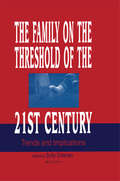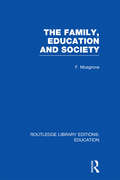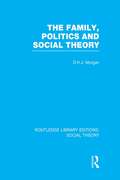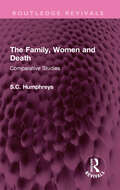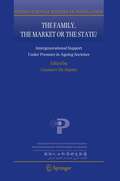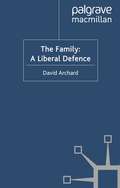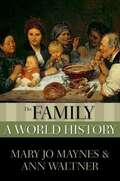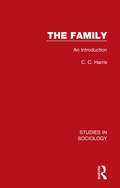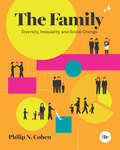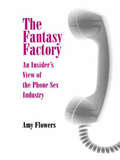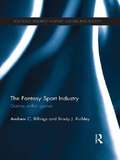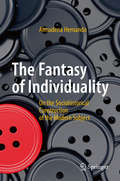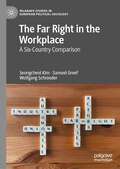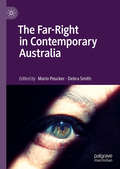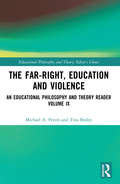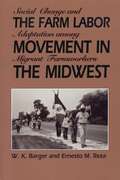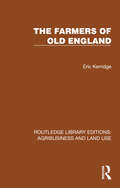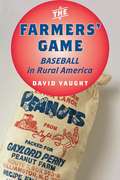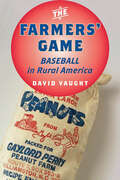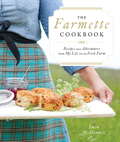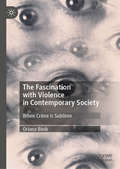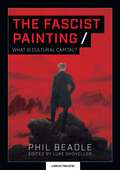- Table View
- List View
The Family on the Threshold of the 21st Century: Trends and Implications
by Solly DremanIs there life for the family in the 21st century? Pessimists view the traditional two-parent nuclear family as a relic of the past, attributing their gloomy outlook to increased demands from the workplace, rampant technological advancement, and the pursuit of personal achievement at the expense of interpersonal needs and values. Optimists, on the other hand, claim that increasing alienation and emphasis on the occupational sphere necessitate a sense of family, community, and belonging as a haven from work-related stress. This volume addresses these and related issues such as the interplay of personal versus interpersonal factors in family development, the role of the extended family, and the interface between work, community and family. The contents of this book--scholarly contributions from a unique interdisciplinary rostrum of behavioral scientists in such diverse fields as psychology, sociology, anthropology, social work, industrial management, and demography--represent the latest developments in research, theory, and practice in family studies. The reader is presented with theoretical formulations, empirical findings, and applied interventions regarding family life in different parts of the world. A systems perspective is adopted as the family is examined at its interface with individuals, community, society, and culture, with the interdependence of these different levels emphasized. In addition, an attempt is made to integrate the work of theoreticians, researchers, and practitioners in understanding the evolving family. Dreman provides a survey of family life in the international arena and finds a surprising consensus between the different disciplinary perspectives and the respective geographical arenas. He discusses life-span issues in relation to all levels of family life including the impact of increased longevity and decreased fertility in relation to topics such as individual development, parent-child and couple relationships, the workplace, and the community. This book also highlights the interplay of biological and interpersonal dynamics as in the case of spousal depression.
The Family, Education and Society (Routledge Library Editions: Education)
by Frank MusgroveIn this provocative study the author challenges many contemporary assumptions about the modern family, the circumstances of home life which lead to academic success and the proper relationship between home and school. The modern family is not ‘in decline’; its history is a success story. It is stable, unsociable, emotionally potent. Over the past three centuries it has turned its back on society. It is less remarkable for rebellious children than for the remorseless pressures it can exert upon the young, particularly for ‘success’ in the school system. In the home-centred society the school is an extension of the home, created in its image. Academic success seems most certain when the ‘good home’ and the ‘good school’ form a determined alliance. The combined pressures of home and school often seem to produce withdrawn, self-disparaging and negative young men and women. The author argues that the good school must counter-act many of the influences of the good home and that the educational system must re-order its affairs so that it is able to encourage and assess achievement which comes from joy rather than neurotic drive.
The Family, Politics, and Social Theory (Routledge Library Editions: Social Theory)
by D.H.J. MorganThis book explores and clarifies all the major issues and developments within ‘family theorising’. It covers the extraordinary growth and variety of approaches to the family over the last decade, the most significant being the impact of feminism and the professional and state intervention into the family through marital and family therapy. The author focuses on the growth of family counselling, giving a detailed analysis of the Home Office publication, Marriage Matters. He looks at the rapid growth of historical studies of the family, European theoretical developments, the work of the Rapoports, the role of systems theorising, and phenomenological and critical approaches to the family. He shows the relevance of family theorising for contemporary debates about the state of marriage and the family, and argues for the centrality of ‘family themes’ within wider sociological debates.
The Family, Women and Death: Comparative Studies (Routledge Revivals)
by S.C. HumphreysOriginally published in 1983 and as a second edition in 1993, this book deals with 3 universal but culturally variable phenomena: the family, women and death. The book poses questions about our own ways of looking at the family and private life, at sex and gender and at death, by analysing ancient Greek ideas and by showing how researchers’ presuppositions have been influenced by their own culture and experience. The views of Fustel de Coulanges on the place of tomb-cult in the evolution of the family in the ancient world are critically examined and related to their 19th Century context; the study of the classical Athenian family is related to current historical and sociological debates on the separation between public and private life.
The Family, the Market or the State?
by Gustavo De SantisThis book touches upon a few of the major challenges that all modern societies will have to face in the near future: how to set up a resilient pay-as-you-go pension system; whether the current balance between expenses and revenues in social expenditure is viable in the future, and, if not, what changes need to be introduced; whether the relative well-being of the current and future cohorts of the old will be preserved, and how their standards of living compare to those experienced by the old in the recent past. At the micro level, the exchanges between generations are presented and discussed in detail: how they have evolved in the recent past in terms of time, money, co-residence and proximity, and what will likely happen next. The geographical scope is on the developed countries, plus South Korea. A rich documentation of tables and graphs supports the scientific analyses and the policy implications in each of the nine chapters of this book, where demography, sociology, and economics intersect fruitfully, both at the macro and at the micro level.
The Family: A Liberal Defence
by David ArchardAn account of the nature and value of the family within a liberal society. It defines 'family', and assesses the right to have a family, whether the family promotes injustice, and what future there is for the family in the face of significant changes.
The Family: A World History (New Oxford World History)
by Mary Jo Maynes Ann WaltnerThis book addresses the question of what world history looks like when the family is at the center of the story. People have always lived in families, but what that means has varied dramatically over time and across cultures. <p><p> The family is not a "natural" phenomenon―it has a history. And family life is not limited to the realm of the private or the strictly personal; the family is a force of history. Gender and generational differences affect how individual family members relate to each other and how the family operates in changing historical times. For example, youth rebellion against repressive elders fed into choices about conversion to Christianity in colonial Kenya in the early twentieth century and also into the May Fourth rebellion against traditional rule in China in 1919. These are the sorts of examples that drive the narrative of The Family: A World History. <p><p> Maynes and Waltner begin their story more than 10,000 years ago with various projects of domestication around the globe - different ways of inventing human settlement and explaining and attempting to control the natural world. The authors then examine how family systems and family practices help to account for the historical fate of different world regions in the era of growing world trade, colonization, and religious warfare and conversions between 1450 and 1750. They make connections between economic, political, and cultural modernity and the transformation of family and gender relationships between 1750 and 1920. Finally, they demonstrate that the struggle over family relations was central to fascist and colonial regimes, Cold War era ideological and economic confrontations, and post-World-War II antagonisms between 'developed' and 'underdeveloped' nations, and, more recently, between the global North and the global South. The narrative concludes with such contemporary realities as transcontinental family life, state programs of genocide, and innovative reproductive technologies. <p><p> Taking a long and broad view of the family as a force of history brings to light processes of human development and patterns of social life that are missed by narrower investigations. This book on the family is thus also engaged in a larger conversation about what it means to be human, and how a very expansive temporal and geographic frame of history brings new insights into the human past and present. Maynes and Waltner draw on a wide range of historical sources including legal codes, census records, memoirs, art, and oral history.
The Family: An Introduction (Studies in Sociology)
by C. C. HarrisOriginally published in 1969, this introduction to the social study of the family was designed both for students of sociology and for students of related subjects requiring familiarity with a similar approach. It is therefore written in language as simple as possible; technical terms are only introduced when indispensable and are always defined. While the book is focused on European and American family systems, the author believed these are intelligible only when placed in a wider context, and so the first part is concerned with kinship, marriage and the family in general. He does not attempt to provide a descriptive account of all the empirical studies available but concentrates on what he considers the chief theoretical problems. In consequence this book is argumentative and critical in approach, and never strays far from the central issues of sociological theory; it is, therefore, of value to both students of sociology and to others interested in the perspective which the discipline can give to the study of the family.
The Family: Diversity, Inequality, and Social Change
by Philip N. CohenLearn the story—and the sociology—behind the data about today’s families. Philip Cohen’s The Family is an accessible, data-driven introduction to contemporary sociological thinking on families. Drawing on his expertise as a sociologist, demographer, and a teacher, Cohen uses data to elucidate key trends in family life and to show how the story of today’s families is a story of diversity, inequality, and social change. In the Third Edition, Cohen has strengthened the book’s coverage of same-sex relationships and revamped the treatment of gender identity, highlighting the most current research and data throughout the text. Innovative pedagogy, including more robust in-text workshops, get students thinking sociologically about their own families and relationships. This purchase offers access to the digital ebook only.
The Fantasy Factory
by Amy FlowersThe Fantasy Factory explores the world of women on the other end of the phone sex lines advertised in magazines like Playboy and Hustler. The author's interviews with these women, as well as her own first-hand experiences as an operator, reveal the complex ways operators and callers negotiate the shifting borders between desire and disgust, fantasy and reality, deception and belief. The Fantasy Factory raises provocative questions about the manufacture of artificial intimacy and the technological mediation of intimacy, as well as about the social construction of sexuality and gender.Flowers discovers that operators--who assume names like Tiffany and Corvette--create a virtual reality in which callers can act out fantasies that operators may find boring, disgusting, or even frightening. She also discovers that even those women who are skilled at keeping their "true self" and their phone sex persona separate find that they have to struggle to protect that self and to maintain the ability to experience real intimacy.
The Fantasy Sport Industry: Games within Games (Routledge Research in Sport, Culture and Society)
by Andrew C. Billings Brody J. RuihleyFantasy sport has become big business. Recent estimates suggest that there as many as 33 million fantasy sport participants in the US alone, spending $3bn annually, with many millions more around the world. This is the first in-depth study of fantasy sport as a cultural and social phenomenon and a significant and growing component of the contemporary sports economy. This book presents an overview of the history of fantasy sport and its close connection to innovations in sports media. Drawing on extensive empirical research, it offers an analysis of the demographics of fantasy sport, the motivations of fantasy sport players and their significance as heavy consumers of sport media and as ultra-fans. It also draws cross-cultural comparisons between fantasy sport players in the US, UK, Europe and beyond. The Fantasy Sport Industry examines the key commercial and media stakeholders in the production and development of fantasy sport, and points to new directions for the fantasy sport industry within modern sport business. It is therefore, fascinating reading for any student, scholar or professional with an interest in sports media, sports business, fandom, the relationship between sport and society, or cultural studies.
The Fantasy of Individuality: On The Sociohistorical Construction Of The Modern Subject
by Almudena HernandoThis volume is a step in fleshing out the historical reasons for gender inequality from the origins of humankind to present times in the Western world. It argues that despite much critique during the last two decades, gender identities are still ultimately understood as closed and rigid categories which unwittingly reproduce modern Western values. It is a theoretically-informed and up-to-date overview of the history of gender inequality that takes as its starting point the mechanisms through which human beings construct their self-identity. It discusses deeply ingrained assumptions on the relationship between gender and materiality in the present that lead both the academic community and the general public alike to reproduce specific patterns of thought about sex and gender and project them into the past. Starting from a peripheral and heterodox perspective, this book intends to appraise the complexity of gender identity in all its richness and diversity. It seeks to understand the persistence of relationality in supposedly fully individualized male selves, and the construction of new forms of individuality among women that did not follow the masculine model. It is argued here that by balancing community and self beyond the contradictions of hegemonic masculinity, modern women are struggling to build a new, more empowering form of personhood. The author is an archaeologist, who uses her discipline not only to provide data, theory and a long-term perspective, but also in a metaphorical sense: to construct a socio-historical genealogy of current gender systems, through an examination of how personhood and self-identity have been constructed in the Western world.
The Far Right in the Workplace: A Six-Country Comparison (Palgrave Studies in European Political Sociology)
by Samuel Greef Wolfgang Schroeder Seongcheol KimThis book offers the first comparative study of far-right messaging and organizing efforts at the workplace level as well as responses by established trade unions, encompassing six European countries (Belgium, France, Germany, Hungary, Italy, Poland). Drawing on semi-structured interviews with workers and trade union actors with a focus on the automobile industry, the volume develops a classification of far-right strategies and trade union counter-strategies in comparative perspective. Based on a research project in cooperation with trade unions, the book is situated at the interface of comparative politics, industrial sociology, political economy, and political sociology.
The Far-Right in Contemporary Australia
by Mario Peucker Debra SmithThis book is the first to elaborate on radical and extreme right movements in contemporary Australia. It brings together leading scholars to present cutting edge research on various facets and manifestations of Australia’s diverse far-right, which has gained unprecedented public presence and visibility since the mid-2010s. The thematic breadth of the chapters in this volume reflects the complexity of the far-right in Australia, ranging from the attitudes of far-right populist party voters and the role of far-right groups in anti-mosque protests, to online messaging and rhetoric of radical and extreme right-wing movements. The contributions are theoretically grounded and come from a range of disciplines, including media and cultural studies, sociology, politics, and urban studies, exploring issue of far-right activism on the micro and macro level, with both qualitative and quantitative research methods.
The Far-Right, Education and Violence: An Educational Philosophy and Theory Reader Volume IX (Educational Philosophy and Theory: Editor’s Choice)
by Michael A. Peters Tina BesleyIn the last decade the far-right, associated with white nationalism, identitarian politics, and nativist ideologies, has established itself as a major political force in the West, making substantial electoral gains across Europe, the USA, and Latin America, and coalescing with the populist movements of Trump, Brexit, and Boris Johnson’s 2019 election in the UK. This political shift represents a major new political force in the West that has rolled back the liberal internationalism that developed after WWI and shaped world institutions, globalization, and neoliberalism. It has also impacted upon the democracies of the West. Its historical origins date from the rise of fascism in Italy, Germany, and Austria from the 1920s. In broad philosophical terms, the movement can be conceived as a reaction against the rationalism and individualism of liberal democratic societies, and a political revolt based on the philosophies of Nietzsche, Darwin, and Bergson that purportedly embraced irrationalism, subjectivism, and vitalism. This edited collection of essays by Michael A Peters and Tina Besley, taken from the journal Educational Philosophy and Theory, provides a philosophical discussion of the rise of the far-right and uses it as a canvas to understand the return of fascism, white supremacism, acts of terrorism, and related events, including the refugee crisis, the rise of authoritarian populism, the crisis of international education, and Trump’s ‘end of globalism’.
The Farm Labor Movement in the Midwest: Social Change and Adaptation among Migrant Farmworkers
by W. K. Barger Ernesto M. RezaThe Farm Labor Organizing Committee (FLOC) was founded by Baldemar Velasquez in 1967 to challenge the poverty and powerlessness that confronted migrant farmworkers in the Midwest. This study documents FLOC's development through its first quarter century and analyzes its effectiveness as a social reform movement. Barger and Reza describe FLOC's founding as a sister organization of the United Farm Workers (UFW). They devote particular attention to FLOC's eight-year struggle (1978-1986) with the Campbell Soup company that led to three-way contracts for improved working conditions between FLOC, Campbell Soup, and Campbell's tomato and cucumber growers in Ohio and Michigan. This contract significantly changed the structure of agribusiness and instituted key reforms in American farm labor. The authors also address the processes of social change involved in FLOC actions. Their findings are based on extensive research among farmworkers, growers, and representatives of agribusiness, as well as personal involvement with FLOC leaders and supporters. "
The Farm and the City: Rivals or Allies
by Prentice-HallContrasts and compares the growth of city versus farm land, describes the concern over farmers moving westward and demographic transitions, and questions the validity of steps to preserve and encourage the contemporary agronomist.
The Farmers of Old England (Routledge Library Editions: Agribusiness and Land Use #16)
by Eric KerridgeOriginally published in 1973, this book tells the story of the English countryside and its inhabitants between 1560 and 1760; the time when British agriculture became the wonder and envy of the world. The history of the land itself is covered, as well as farming techniques and a farming as a business. The day-to-day existence of rural people, their ambitions and conditions of work are brought to life. The book distils the history of rural England and takes the reader to the heart of England itself.
The Farmers' Game: Baseball in Rural America
by David Vaught<p>Anyone who has watched the film Field of Dreams can’t help but be captivated by the lead character’s vision. He gives his struggling farming community a magical place where the smell of roasted peanuts gently wafts over the crowded grandstand on a warm summer evening just as the star pitcher takes the mound. <p>Baseball, America’s game, has a dedicated following and a rich history. Fans obsess over comparative statistics and celebrate men who played for legendary teams during the "golden age" of the game. In The Farmers' Game, David Vaught examines the history and character of baseball through a series of essay-vignettes. He presents the sport as essentially rural, reflecting the nature of farm and small-town life. <p>Vaught does not deny or devalue the lively stickball games played in the streets of Brooklyn, but he sees the history of the game and the rural United States as related and mutually revealing. His subjects include nineteenth-century Cooperstown, the playing fields of Texas and Minnesota, the rural communities of California, the great farmer-pitcher Bob Feller, and the notorious Gaylord Perry. <p>Although—contrary to legend—Abner Doubleday did not invent baseball in a cow pasture in upstate New York, many fans enjoy the game for its nostalgic qualities. Vaught's deeply researched exploration of baseball's rural roots helps explain its enduring popularity.</p>
The Farmers' Game: Baseball in Rural America
by David VaughtHow rural America shapes America’s favorite pastime.Winner of the SABR Baseball Research Award of the Society for American Baseball ResearchAnyone who has watched the film Field of Dreams can’t help but be captivated by the lead character’s vision. He gives his struggling farming community a magical place where the smell of roasted peanuts gently wafts over the crowded grandstand on a warm summer evening just as the star pitcher takes the mound. Baseball, America’s game, has a dedicated following and a rich history. Fans obsess over comparative statistics and celebrate men who played for legendary teams during the "golden age" of the game. In The Farmers' Game, David Vaught examines the history and character of baseball through a series of essay-vignettes. He presents the sport as essentially rural, reflecting the nature of farm and small-town life. Vaught does not deny or devalue the lively stickball games played in the streets of Brooklyn, but he sees the history of the game and the rural United States as related and mutually revealing. His subjects include nineteenth-century Cooperstown, the playing fields of Texas and Minnesota, the rural communities of California, the great farmer-pitcher Bob Feller, and the notorious Gaylord Perry. Although—contrary to legend—Abner Doubleday did not invent baseball in a cow pasture in upstate New York, many fans enjoy the game for its nostalgic qualities. Vaught's deeply researched exploration of baseball's rural roots helps explain its enduring popularity.
The Farmers' Game: Baseball in Rural America
by David VaughtA journey through the national pastime’s roots in America’s small towns and wide-open spaces: “An absorbing read.” —The Tampa TribuneIn the film Field of Dreams, the lead character gives his struggling farming community a magical place where the smell of roasted peanuts gently wafts over the crowded grandstand on a warm summer evening, just as the star pitcher takes the mound. In The Farmers’ Game, David Vaught examines the history and character of baseball through a series of essay-vignettes—presenting the sport as essentially rural, reflecting the nature of farm and small-town life.Vaught does not deny or devalue the lively stickball games played in the streets of Brooklyn, but he sees the history of the game and the rural United States as related and mutually revealing. His subjects include nineteenth-century Cooperstown, the playing fields of Texas and Minnesota, the rural communities of California, the great farmer-pitcher Bob Feller, and the notorious Gaylord Perry.Although—contrary to legend—Abner Doubleday did not invent baseball in a cow pasture in upstate New York, many fans enjoy the game for its nostalgic qualities. Vaught’s deeply researched exploration of baseball’s rural roots helps explain its enduring popularity.
The Farmette Cookbook
by Imen Mcdonnell"The Farmette Cookbook documents Imen McDonnell's extraordinary Irish country cooking journey, which began the moment she fell in love with an Irish farmer and moved across the Atlantic to County Limerick. This book's collection of 125 recipes and colorful stories chronicles nearly a decade-long adventure of learning to feed a family (and several hungry farmers) while adjusting to her new home (and nursing a bit of homesickness). Along the way she teaches us foundational kitchen skills and time-honored Irish traditions, sharing wisdom from her mother-in-law and other doyennes of Irish cooking. We learn the ritual of Sunday lunch, pudding, and tea. We go along with her on wild crafting walksuthe country version of foraging for wild edibles. We visit her local fishmonger to see what we can create with his daily catch from the sea. Along the way we see how she's deviated from classic Irish recipes to add contemporary or American twists. The Farmette Cookbook is a compilation of tried-and-true recipes with an emphasis on local, fresh ingredients and traditional Irish kitchen skills, which for Imen have healed homesickness and forged new friendships. "
The Fascination with Violence in Contemporary Society: When Crime is Sublime (Palgrave Studies In Crime, Media And Culture Ser.)
by Oriana BinikThis book directly explores the question of why contemporary society is so fascinated with violence and crime. The Fascination with Violence in Contemporary Society posits that the phenomenon is, in part, because we have all become consumers of the sublime: an intense and strongly ambiguous emotion which is increasingly commodified. Through the experience of violence and the sense of disorientation that accompanies it, we obsessively seek out moments of intensified existence. Equally, crime continues to speak to the depths of the collective unconscious, questioning us about our transience and the model of society we wish to live in. Binik proposes that this is why the reaction to violence has become a tool with which to express and take ownership of a desire for social cohesion. This book uses interviews with viewers, dark tourists, collectors and others to further interrogate this social trend. Many of these are participants in the four key case studies explored within the study: emotional pathways while watching a true-crime TV series, the trend of dark tourism, murderabilia collecting and the fanaticism of (and for) Anders Breivik. This book seeks to answer one of the most pressing cultural trends of the modern age and fill in a gap in the criminological literature on the subject.
The Fascist Painting: What is Cultural Capital?
by Phil BeadleThe Fascist Painting is a serious, rich and deeply intelligent piece of work that will radically alter the way we view culture in schools and will be a key text for anyone designing a curriculum. The Ofsted Inspection Framework states that cultural capital is 'The essential knowledge that pupils need to be educated citizens' and that schools 'should be introducing [students] to the best that has been thought and said and helping to engender an appreciation of human creativity and achievement'. They are now considering, 'the extent to which schools are equipping pupils with the knowledge and cultural capital they need to succeed in life.' But what does this term mean? And how are schools to respond to this? In this densely argued and wide-ranging text, Phil Beadle answers those questions and many more by using the work of Pierre Bourdieu to prompt a discussion of how we improve the provision of cultural capital in our schools. Where does the best that has been thought and said come from? Why is the government importing the unexamined language of the private school into the state sector? What is the real purpose behind character education? Does sport, as is reputed, teach resilience, and why would anyone think it was appropriate to teach children a quality they already have? Is cultural capital just ruling class culture? Chiefly, does using a term originated by a French intellectual and radical sociologist to instate the culture of the rich as being superior prove anything other more than a complete absence of thought, or have they accidentally given us a radical tool to change education for the better?
The Fascist Painting: What is Cultural Capital?
by Phil BeadleThe Fascist Painting is a serious, rich and deeply intelligent piece of work that will radically alter the way we view culture in schools and will be a key text for anyone designing a curriculum. The Ofsted Inspection Framework states that cultural capital is 'The essential knowledge that pupils need to be educated citizens' and that schools 'should be introducing [students] to the best that has been thought and said and helping to engender an appreciation of human creativity and achievement'. They are now considering, 'the extent to which schools are equipping pupils with the knowledge and cultural capital they need to succeed in life.' But what does this term mean? And how are schools to respond to this? In this densely argued and wide-ranging text, Phil Beadle answers those questions and many more by using the work of Pierre Bourdieu to prompt a discussion of how we improve the provision of cultural capital in our schools. Where does the best that has been thought and said come from? Why is the government importing the unexamined language of the private school into the state sector? What is the real purpose behind character education? Does sport, as is reputed, teach resilience, and why would anyone think it was appropriate to teach children a quality they already have? Is cultural capital just ruling class culture? Chiefly, does using a term originated by a French intellectual and radical sociologist to instate the culture of the rich as being superior prove anything other more than a complete absence of thought, or have they accidentally given us a radical tool to change education for the better?
